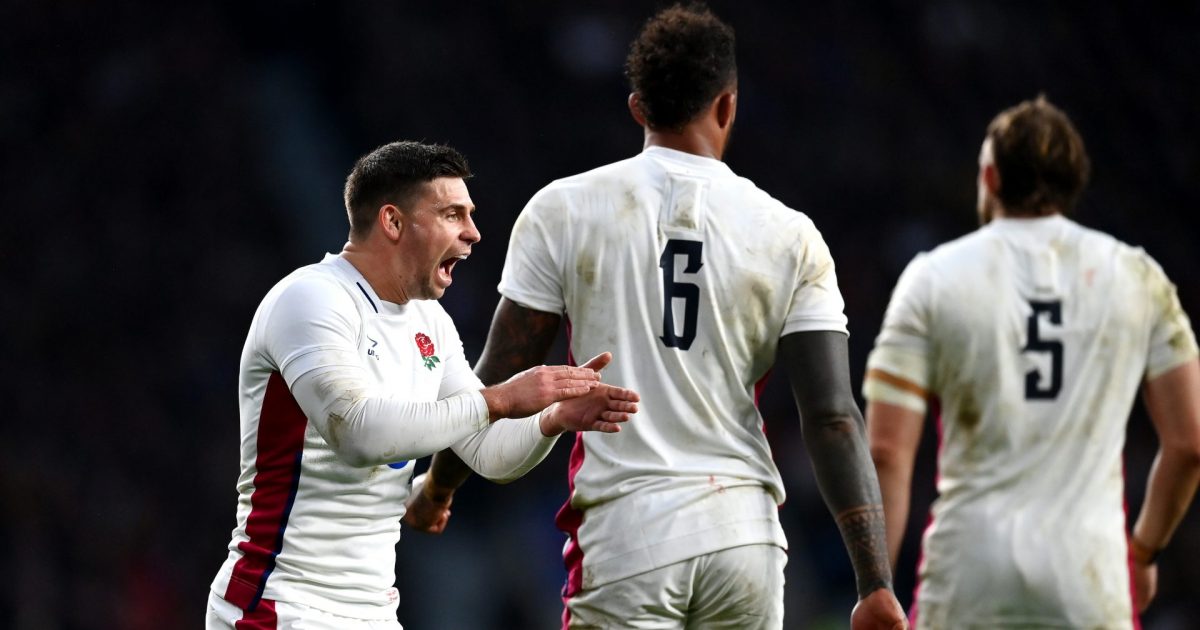Why Ben Youngs craves 'Raffi's D and Harry's feel for when to tap'

Twelve years after making a Test level debut against Scotland in March 2010 as a fresh-faced 21-year-old, Ben Youngs will head back to Murrayfield next weekend as the second oldest member of the current England squad. Only Courtney Lawes, who turns 33 on February 23, eclipses the veteran scrum-half in the age stakes.
However, while you would understandably think that Youngs has seen and lived it all throughout his 110 appearances for England, there has very much been a refocus in recent times that is very much keeping him on his toes.
Youngs turns 33 next September but rather than having the likes of the 35-year-old Willi Heinz, the soon-to-be-30 Dan Robson or the 29-year-old Ben Spencer vying for his jersey, he now has competition in the guise of the 24-year-old Harry Randall and the 20-year-old Raffi Quirke.
With these whippersnappers being so young and each having just two caps so far in their fledgling England careers, you might say that Youngs shouldn’t have much to watch out for given he has been on the international scene for so long, but the veteran scrum-half has a forensic eye trained on both rookies to see what fresh tricks of the trade he can pick up and add to his own arsenal.
Of course, it is a two-way street, Youngs volunteering whatever knowledge he can to help Randall and Quirke made the grade at international level. But it is intriguing all the same what the old dog England No9 is learning from the two youngsters battling it out to provide the bench cover to Youngs next weekend at Murrayfield.
“Harry came in the last Six Nations, got injured halfway through the tournament, did his ankle in training,” began Youngs when asked by RugbyPass about his rapport with the cub England No9s now keeping him company in the squad. “I know Harry anyway, knew him before he was even in the squad for the last Six Nations. And then Raffi, it’s sort of a breakthrough year for him I guess doing the U20s and then coming through this season.
“They are like sponges those two. They want to learn, they want to ask questions, they want to know, they want to work together and it is great for me. You look at those guys and what they are bringing. We are seeing this young crop of nines now which is exciting.
“For me, it means I have got to learn off them and find more in myself and equally for them they can learn something off me and also find a bit more as well because of all three of us. Yeah, the position seems to be in good shape certainly.”
Tell us more: what can a Test veteran really learn from some rookie newcomers? “One of Raffie’s real good strengths is obviously he has naturally got his running game and all those bits but what he does in defence and the pressure he puts on and how he gets in a line, you see with Alex Sanderson that he has already sort of had that role at Sale and it has rubbed off on him and I’m looking at that and seeing what that is.
“Harry has got a natural feel for when to up the tempo. He looks to quick-tap a lot at Bristol and it’s just looking at when he chooses to do those opportunities, picking his brains about that and what he is looking for – why did you do it then and why not then?
“My running game is something that I really enjoy and I still pride myself on so if I can get a bit of Raffi’s D in me and a bit of Harry’s feel for when to tap, it adds and I can just pass on my experience to them knowing that we hopefully can help each other. That is the goal.”
Being twelve and eight years older than the newbies, what has it been like the 30-something to get on their wavelength? “Quite easy to be fair. When you are a rugby player and you are in a changing room every day you kind of never grow up. It’s quite alright, to be honest with you.
“When they are young guys at their club they have got guys that are all different ages and all different backgrounds like that, so coming together (with England) is pretty easy. We always find something in common, so it is not hard at all.”
Jones has undoubtedly shaken up the make-up of his England squad since last year’s fifth-place Six Nations finish, introducing a flurry of new faces that have given the set-up a more youthful complexion. Having been so long on the go, Youngs could understandably have also been handed his cards but he demonstrated across the Autumn Nations Series he is still a big-game player.
What especially keeps coming back for more in the England shirt? “There is plenty that keeps me coming back. I love what I do, firstly. That is the biggest motivation, I love what I do and that love has never gone so if you love what you do, why would you lose motivation?
“For me, I love it, I love competing, I love playing rugby, I love getting the opportunity to represent England and I still feel like I can add. It’s great. I saw Matt Giteau the other day, he has signed another year in America. He played in the ’03 World Cup. Why is he doing it? Because he still loves the game, he still feels like he can add. It’s no different for anyone. We’re sportsmen, we compete and that is what I am about.”




























